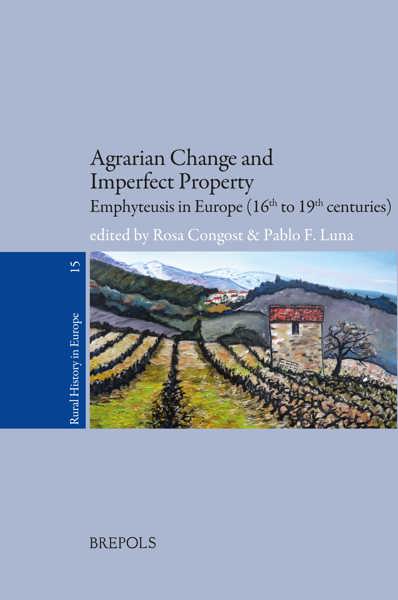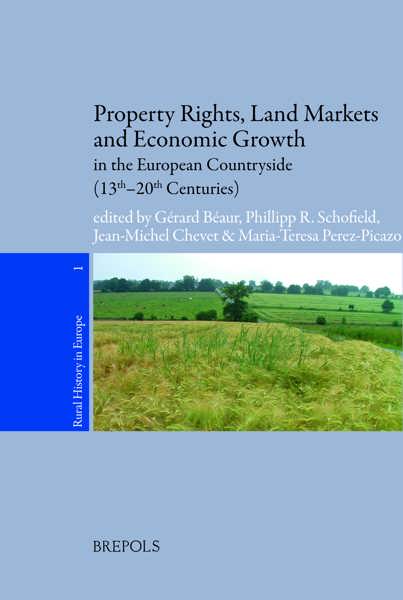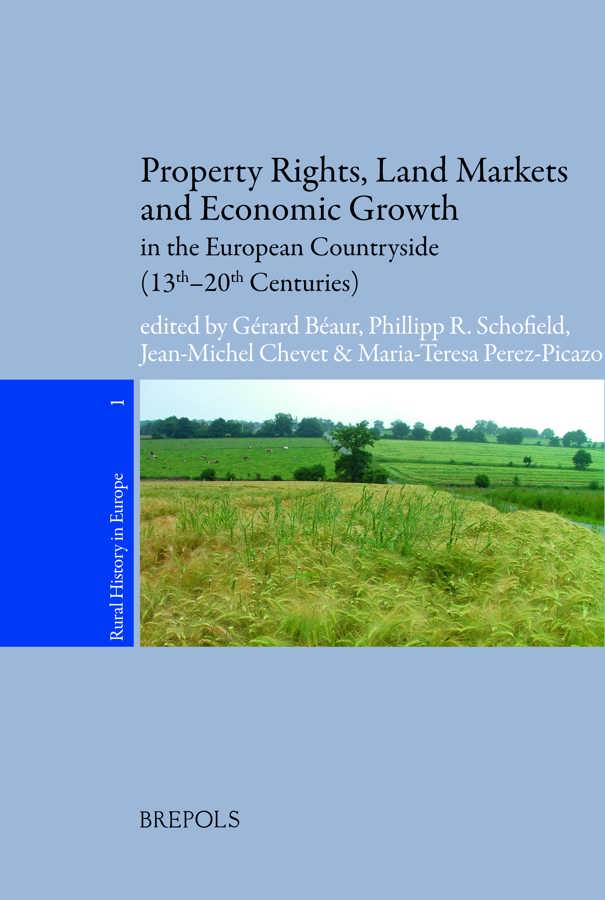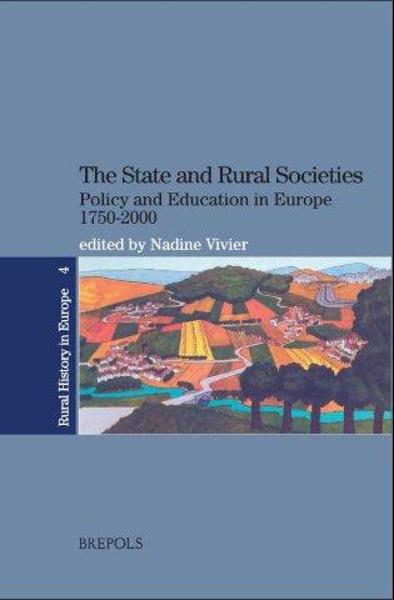
Property Rights, Land Markets and Economic Growth in the European Countryside (13th-20th Centuries)
Gérard Béaur, Phillipp R. Schofield, Jean-Michel Chevet, Maria-Teresa Perez-Picazo (eds)
- Pages: 535 p.
- Size:156 x 234 mm
- Language(s):English
- Publication Year:2013
- € 85,00 EXCL. VAT RETAIL PRICE
- ISBN: 978-2-503-52955-4
- Paperback
- Available
- € 85,00 EXCL. VAT RETAIL PRICE
- ISBN: 978-2-503-55875-2
- E-book
- Available
« Ce remarquable ouvrage (…) représente un bon garde-fou contre une propension à la simplification, trop répandue dans nombre d’histoires économiques, mais aussi contre les généralisations hâtives, qui n’ont de « scientifiques» que le nom, suscitées par un engouement absurde pour des langages et desméthodes d’une discipline, l’économie néoclassique, qui, commele souligne D. North lui-même, est incapable d’expliquer de manière satisfaisante les processus de développement. » (Luca Mocarelli, dans : Annales. Histoire, Sciences sociales, n° 1-2015, p. 248)
“This recent volume (…) must be regarded as the most important compilation of up-to-date scholarship on pre-industrial property rights.” (Daniel Curtis, in Landscape History, 2014, p. 102)
“(…) a very interesting book, which manages to make a substantial contribution to knowledge.” (Guido Alfani, in Economic History Review, 1, 2015, p. 374)
“(...) un dialogue entre l’histoire rurale consacrée au foncier et les recherches sur les institutions de la propriété dans les pays du Sud, favoriserait un échange très fructueux sur le plan des méthodes. Il permettrait, entre autres, d’incorporer le sens de la longue durée dans les travaux sur le foncier aujourd’hui, mais aussi de situer les travaux historiques, comme les études de cet excellent livre, dans un contexte beaucoup plus global et qui participe des mêmes inquiétudes. (Juan Carmona, dans Histoire & Mesure, 1, 2015, p. 204)"
"En suma, la diversidad de casos estudiados y la amplitud de la información ofrecida convierten este libro en un texto único para estudiar el papel de los derechos de propriedad en el desarollo agrario." (Salvador Calatayud, in: Historia agraria 68, 2016, p. 212-218)
"(...) lo cierto es que el libro aporta reflexiones y análisis nuevos, que los territorios estudiados son muy representativos y a la vez muy distintos en sus realidades históricas y físicas –desde las áreas alpinas de alta montaña a las secas llanuras castellanas- y que los diferentes autores, pertenecientes a tradiciones investigadoras diferentes, han sabido responder a las cuestiones que se les proponían, de modo que la diversidad de sus respuestas –incluso disparidades- no obedecen a planteamientos teóricos inamovibles, sino a evidencias históricas medibles y comparables." (Ofelia Rey Castelao, in: Mundo agrario, August 2014, http://www.mundoagrario.unlp.edu.ar/article/view/5359/6000)
« Il est juste de répondre qu’on ne peut tout dire et qu’en tout cas cet ouvrage apporte beaucoup.» (Guy Lemarchand, dans Revue d’histoire moderne et contemporaine, 63-4, 2016, p. 220)
By exploring the fundamental issues of property rights and markets in land, this book will offer important insights into long-term economic change in Europe. The essays gathered here provide a major consideration of the institutional constraints which can be employed by historians and other commentators in order to explain both the slowness or even absence of growth in certain areas of the European economy between the thirteenth and nineteenth centuries, as well as the discrete experiences of countries within Europe in this broad period.
This is an issue of current interest not least because discussion of 'institutional determinism' has become a standard of explanations of historical and economic change; that said, those promoting such approach have sometimes been criticised for generalising from an 'institutional' perspective rather than taking full account of the variety of potential causative explanations within particular historical contexts.
The present collection of essays will therefore explore the conditions which permitted the progress of agriculture in Europe and the emergence of capitalism in the countryside. The research presented in this volume helps to demonstrate that changes in the market (demand, relative prices...) encouraged changes in property rights but certainly did not do so in ways that were consistent or that led inexorably towards individual and exclusive rights of the kind described by the nineteenth-century liberal paradigm.
Specialist of rural and economic history, Gérard Béaur is Directeur de Recherches at CNRS and Directeur d’Etudes at EHESS (Paris, France). He is member of the Centre de Recherches Historiques and he was director of this unit of research from 2002 to 2010. He was Chair of the COST Action A35 Progressore and he is actually director of the GDRI (International Research Network, CNRS) CRICEC (Crises and Changes in the European Countryside).
Phillipp Schofield is Professor of Medieval History and Head of the Department of History and Welsh History, Aberystwyth University. His research interests focus on rural society in England in the high and late Middle Ages.
Jean-Michel Chevet is a French researcher in the Institut National de la Recherche Agronomique. He is a specialist in the economic history of the countryside, particularly of the development of the English and French economies and of the history of viticulture.
Maria-Teresa Pérez-Picazo was Professor of Economic History at the University of Murcie (Spain). Her principal work was on agrarian history and she focused particularly on the subject of water management in the modern period.




